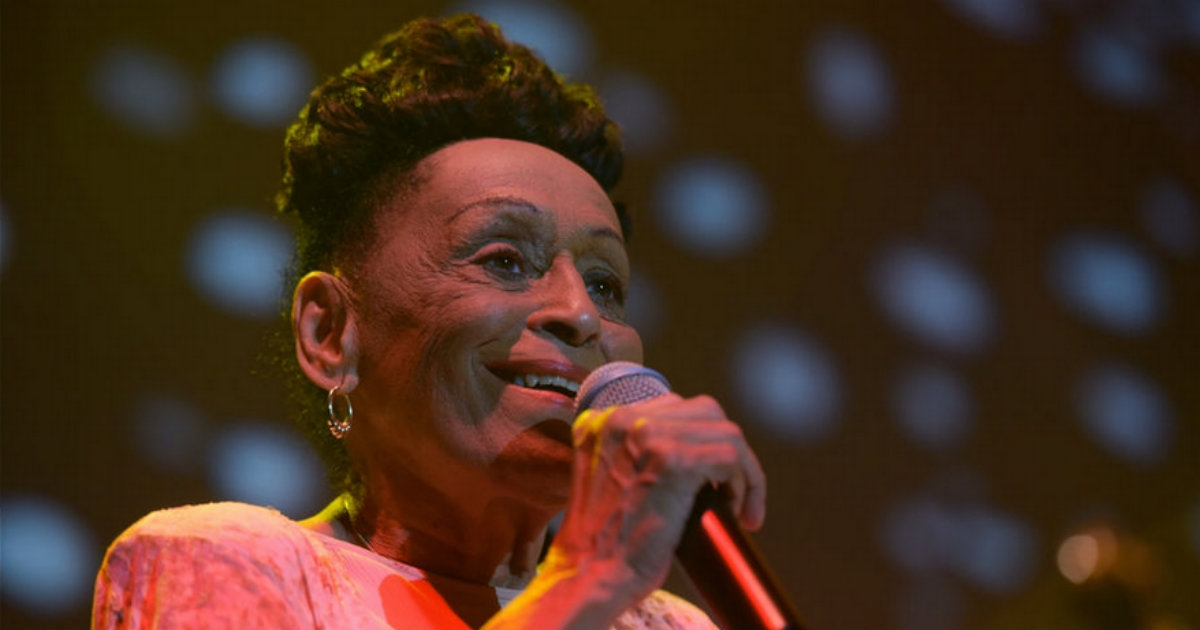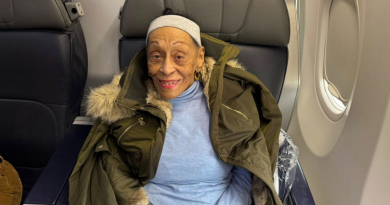
Omara Portuondo Peláez is one of the most significant Cuban feeling singers of all time. She was born in Havana, Cuba, on October 29, 1930.
Her mother belonged to a Cuban family of noble descent with Spanish ancestry, and she was expected to marry into other families of society, but she eloped with the man she loved, a baseball player from the national team. The marriage had three daughters, and like in any Cuban home, there was music; they didn’t have money, but they had the voices of their parents singing in the kitchen where they lived their daily lives. Omara, who was born in the Cayo Hueso neighborhood of Havana, remembers her songs, including among her favorites La bayamesa by Ernesto Grenet and Sindo Garay (also sung by Compay Segundo in Buena Vista Social Club). These were her first informal singing lessons, and these songs became part of her lifelong repertoire.
When her sister Haydée became a dancer at the famous cabaret Tropicana, Omara soon followed her, by chance: the dance company was short one dancer one day in 1945 when a performer withdrew two days before an important opening. Omara had watched her sister rehearse so often that she knew all the steps, so they asked her to take the vacant spot. “It was a very chic cabaret, but I said it was unacceptable,” Omara recalls. “I was very shy and embarrassed to show my legs.” But her mother convinced her by saying that she couldn't let them down; thus began her career as a dancer, forming a famous duo with dancer Rolando Espinosa.
On weekends, Omara and Haydée would sing jazz standards with some friends: César Portillo de la Luz, José Antonio Méndez, and pianist Frank Emilio Flynn. They called themselves Loquibambla Swing, and the style they played, a Cubanized version of bossa nova with jazz influences, became known as "feeling" or, in Spanish, "filin." In her radio debut, Omara was introduced as Omara Brown, the girlfriend of filin. That stage name was soon forgotten, but not the definition that accompanied it.
In 1950, she was a member of the Orquesta Anacaona, and by 1952, Omara and her sister Haydée Portuondo were forming a female vocal quartet with Elena Burke and Moraima Secada, led by the pianist Aída Diestro. They became one of the most important vocal quartets in Cuban music, and Omara remained with the group Las De Aída for 15 years, although the original lineup only recorded one album for RCA Victor in 1957. They undertook numerous tours throughout America with innovative vocal arrangements by Aída; they had the opportunity to share the stage with Édith Piaf, Pedro Vargas, Rita Montaner, Bola de Nieve, and Benny Moré and also served as backup for Nat King Cole during his performance at Tropicana.
He made his solo debut with the album Magia negra, released in 1959, which blends Cuban music and jazz and includes renditions of That Old Black Magic and Caravan by Duke Ellington. He then continued with Las De Aída until 1967, the year he finally dedicated himself to his solo career, performing in Cuba and at various festivals abroad representing the country.
In the 1970s, she sang with the Orquesta Aragón and traveled extensively, performing in several countries such as France, Japan, Belgium, Finland, and Sweden. Omara made many recordings over the following two decades; however, the standout is the album she recorded with Adalberto Álvarez in 1984, along with two released for the Spanish label “Nubenegra”: “Palabras” and “Desafíos.”
The Cuban director Fernando Pérez Valdés made a documentary about the singer titled Omara in 1983.
In 2000, World Circuit released Buena Vista Social Club presents... Omara Portuondo, the third album by this group featuring musicians such as Rubén González, Orlando ''Cachaíto'' López, Manuel ''Guajiro'' Mirabal, and Jesús "Aguaje" Ramos, as well as guest appearances by artists like Eliades Ochoa, Compay Segundo, Manuel Garban and Ibrahim Ferrer.
The album, received with great critical acclaim, led Omara on a world tour in 2000-2001 with her Buena Vista colleagues Rubén González and Ibrahim Ferrer.
In 2002, he conducted an extensive international solo tour, with numerous dates in North America and Europe. In the fall of the same year, he participated in the Jazz Festival in Japan.
In 2003, he/she went on a tour of Canada and the United States.
In September 2003, he recorded at the EGREM studios what would become his second solo album produced by World Circuit.
The album Flor de amor marks a change in direction, with Cuban musicians joined by a selection of Brazilian artists giving the record a unique sound.
On November 5, 2009, she won the Latin Grammy Award in the category of Best Contemporary Tropical Album for Gracias, but what is significant is that she became the first Cuban artist residing in her country to win this prestigious award and collect it with her own hands. In the album, Omara takes listeners on a journey through her 60 years of artistic career, featuring special contributions from Cubans Silvio Rodríguez and Pablo Milanés, Uruguayan Jorge Drexler, and Brazilian Chico Buarque.
In 2010, she recorded a song for the Spanish version of the movie The Princess and the Frog, titled Taina y el sapo, from Walt Disney, performing a song by the elder Mama Odie: Dig a Little Deeper. For the soundtrack of the Latin American version, titled La princesa y el sapo, she did not record any.
In September 2020, she was nominated for her album *Mariposas* for the award of 'Best Contemporary/Tropical Fusion Album' at the 2020 Latin Grammy Awards.
In October 2020, on the occasion of her 90th birthday, Portuondo offered an online concert alongside flutist Ethiel Faílde, during which she performed songs like "20 años" and "Dos Gardenias," which have been so significant in her musical repertoire over the years.

